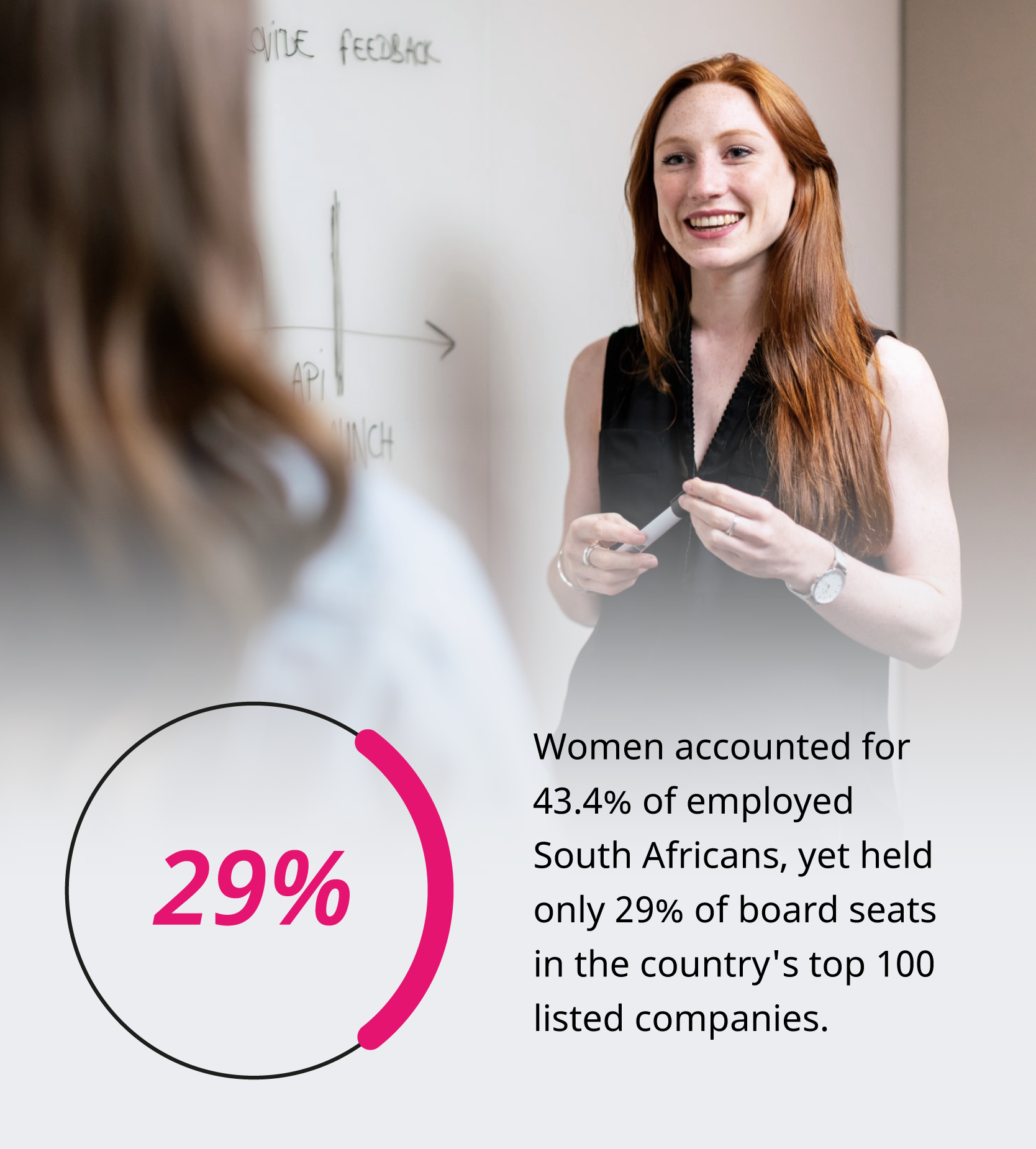Women Disrupting the South African Workplace
The South African Government has prioritized initiatives that address the unequal economic and social position of women,1 yet overcoming gender inequality in the workplace remains a major challenge across industries. Although women make up 51.1 percent of the population (30.75 million), they remain relatively underrepresented in positions of authority and power.2
While women accounted for 43.4 percent of employed South Africans in the second quarter of 2021,3 they held only 29 percent of board seats in the country’s top 100 listed companies – an indication that much more needs to be done to level the playing field.4

Gender pay gap remains a challenge
South Africa’s Constitution is one of the most progressive in the world and provides for the right to equality (including gender equality), equal protection and benefit before the law, and nondiscrimination.5
However, despite the emphasis on these rights, women’s socioeconomic empowerment hasn’t advanced as rapidly as hoped. The gender pay gap is arguably the most significant barrier between women and career progression, both locally and globally. On average, South African women earned R72.44 to every R100.00 earned by men in 2021.6
This pay gap is in direct opposition to the number of women graduating from tertiary institutes versus men. Globally, women are more likely to be enrolled in higher levels of education than men.7 However, in the pandemic’s weak labor market, men are 3.5 percent more likely than women to ask for a raise.8
Worldwide, women are generally paid less for similar work or don’t ascend to higher job levels as quickly as their male counterparts. This trend worsens once employees, specifically women, become parents. In the UK, for example, the average employment and work hours of men barely change after they become fathers, while the employment of women falls sharply from above 90 percent to below 75 percent after childbirth. For those who remain in paid work, work hours fall from around 40 to less than 30 per week. What’s more, the hourly wages earned stagnate for working mothers while continuing to grow uninterrupted for fathers.9
In South Africa, where more than 42 percent of women are single parents, this bias deepens.10 Employers often overlook the challenge of being a working parent, single or supported, and working mothers are frequently regarded as less desirable employees. It’s worth noting that female employees are significantly more likely to say it’s very important to them that their jobs allow greater work-life balance and better personal wellbeing. As a result, companies willing to support parents’ personal lives are the ones with higher retention rates.11
The past few years have seen a wave of advocacy for gender equality in the workplace and recognizing the importance of women in business and leadership roles. The year 2020 marked the 10th anniversary of the Women’s Empowerment Principles (WEPs), a robust guide with principles dedicated to improving gender equity in companies. Since the launch of WEPs, the justification for equalizing gender representation in business has continued to increase, which is evident in companies’ commitment to ensure both men and women are empowered to contribute to and benefit from workplace policies and programs.12
Women in leadership positions offer a competitive advantage
In 2022, two years after the start of the COVID-19 pandemic, more women were emerging as strong leaders and taking on the extra work that comes with their new roles. Compared to men at the same level, women were doing more to support their teams and advance diversity, equity, and inclusion efforts.
Current research reinforces the link between diversity and company financial performance,13 and suggests ways in which organizations can craft better inclusion strategies to gain a competitive edge. A greater proportion of women and a more mixed ethnic and cultural composition in the leadership of large companies is linked to profitability.14 Similarly, gender diversity is directly correlated to leadership effectiveness, productivity, and value creation. Research also shows that businesses with greater gender diversity, not just within their general workforce but among senior leaders, are significantly more profitable than those that are less diverse.15
The conclusion is that, if organizations want to thrive and strengthen team development, they have to “get to equal.”
SA female leaders are challenging the status quo
According to UNESCO, only 35 percent of science, technology, engineering, and mathematics (STEM) students in higher education are women, and differences are observed within STEM disciplines worldwide.16 The same is true in other corporate roles: many companies desperately need female representation in leadership and executive positions. What is encouraging is in spite of women struggling to obtain an equal footing with their male counterparts, studies show that 50 percent more women are enrolling for tertiary degrees than men.17
There are, however, female business leaders in South Africa who are challenging the status quo. Armed with courage, creativity, and discernment, these women (and there are many) are contributing to workplace transformation. Here are just five female powerhouses changing the game in their industries.

Five inspirational SA female leaders
1. Phuti Mahanyele-Dabengwa
Africa’s largest public company, Naspers, appointed Phuti Mahanyele-Dabengwa as CEO of its South African business in July 2019, ahead of an offshore listing of the company’s international assets.18 She joined Naspers after serving as executive chairperson at Sigma Capital, a privately held, majority black-owned investment group.19 Mahanyele-Dabengwa has a bachelor’s degree from Rutgers University in the United States and a Master of Business Administration from De Montfort University in the United Kingdom.20
“We’re all facing challenges, but they’re all challenges that can yield opportunities,” she says. “It’s about what all citizens can do to contribute to a better South Africa.”21
2. Ntombozuko ‘Soso’ Motloung
As Chief Solutions Engineer for Cisco, Ntombozuko Motloung helms the company’s networking academy in South Africa. She is responsible for building a community of mentors who will, in turn, help guide aspirant technology workers.22 Motloung overcame abject poverty to focus on and pursue an education, followed by a career in the IT and technical management fields.
Her legacy extends to the next generation: “My 11-year-old daughter is starting her own nonprofit organization, looking at assisting people who are less fortunate, especially the homeless, to get them into a route that’s going to lead them to education or get them out of that situation,” she says.23
3. Aisha Pandor
Aisha Pandor, co-founder and CEO of SweepSouth, is one of very few black female tech startup CEOs, both locally and abroad. She launched SweepSouth, Africa’s first digital application that provides turnkey home-cleaning solutions, in June 2014. Since then, the innovative company has become one of the fastest-growing startups in the country. It currently operates in four South African cities, providing work opportunities for thousands of women.24
“While studying for my PhD, I always thought about what type of work I would do and whether that work would be aligned with my purpose in life. The SweepSouth app was launched seven years ago, focusing on changing the mindset of home service professionals. The value of having supportive networks such as a partner, colleagues and family played an important role when having your own business,”25 says Pandor.
4. Nonkululeko Nyembezi-Heita
CEO of ArcelorMittal South Africa, Nonkululeko Nyembezi-Heita, was listed eighth in Forbes magazine’s Most Powerful Black Women in the World (2011). Her leadership style incorporates an interactive approach to engaging with her teams, along with maintaining a light and broad-minded touch to guiding employees26 and she has held executive and board-level positions across the financial services, mining, IT, and telecommunications sectors.
A trailblazer and an astute entrepreneur widely respected for her business acumen, Nyembezi holds a BSc Honours degree in electrical engineering from the University of Manchester Institute of Science and Technology and a master’s degree in the same discipline from the California Institute of Technology. She also obtained an MBA from the Open University in the United Kingdom.
“I know that talent emerges from the most unexpected places,” she says. “So in the process of recruitment, a big part of my role as CEO, I actively strive for diversity so I can draw inputs from far and wide.”27
5. Thabiso Mahlape
In 2010, Thabiso Mahlape started as an intern at Jacana Media. In a few years, she was able to transform the South African literary landscape. Blackbird Books, the publishing house she launched in 2015, became a groundbreaking new platform to support and nurture a new generation of black writers.
Thabiso polished her publishing skills with acclaimed bestsellers like Endings and Beginnings by Redi Tlhabi, My Father, My Monster by Mcintosh Polela, and Malaika wa Azania’s Memoirs of a Born Free.
While it was daunting to wear the mantle of the first black woman to manage a publishing house, this challenge dimmed in comparison to the industry-wide recognition she also received.28
“I wanted to be able to curate on my own terms the kind of African Literature that I think people who look like me should be reading,” Mahlape says. “It was important to create work that represented black people in a more realistic way.”29
- 1 (2020). ‘National Strategic Plan on Gender-Based Violence & Femicide’. Retrieved from the Department of Women, Youth and Persons with Disabilities.
- 2 (Jul, 2021). ‘Mid-Year Population Estimates’. Retrieved from StatsSA.
- 3 (Aug, 2021). ‘South African labour market is more favourable to men than women’. Retrieved from StatsSA.
- 4 Changole, A. (Apr, 2021). ‘South Africa outperforms on female directors, with work to do’. Retrieved from Bloomberg.
- 5 (1996). ‘The Constitution of the Republic of South Africa’. Retrieved from South African Government. Accessed January 7, 2022.
- 6 (Mar, 2021). ‘Gender Pay Gap Pilot Report 2021’. Retrieved from the South African Institute for Inequality Studies.
- 7 (Mar, 2021). ‘Global Gender Gap Report’. Retrieved from World Economic Forum.
- 8 Konkel, A. (Mar, 2021). ‘Gender gap in requests for pay, promotion widens in pandemic’. Retrieved from Indeed Hiring Lab.
- 9 (Mar, 2021). ‘The careers and time use of mothers and fathers’. Retrieved from IFS.
- 10 (May, 2021). ‘Families and parents are key to well-being of children’. Retrieved from StatsSA.
- 11 Mann, A. & Adkins, A. (Nd). ‘What star employees want’. Retrieved from Gallup. Accessed January 12, 2022.
- 12 Sheakoski, J. (Mar, 2020). ‘Womens’ empowerment and business: 2020 Trends and opportunities’. Retrieved from BSR.
- 13 (Sep, 2021). ‘Women in the workplace’. Retrieved from McKinsey.
- 14 (Sep, 2021). ‘Women in the workplace’. Retrieved from McKinsey.
- 15 (Mar, 2021). ‘10 Reasons why the world needs more women in leadership roles’. Retrieved from Natural HR.
- 16 (Nd). ‘Girls’ and women’s education in science, technology, engineering and mathematics (STEM)’. Retrieved from UNESCO. Accessed January 7, 2022.
- 17 Greenfield, N. (Oct, 2021). ‘With 50% more women than men enrolling, is HE failing?’ Retrieved from University World News.
- 18 Hedley, N. (Jul, 2019). ‘Naspers appoints Phuti Mahanyele-Dabengwa as SA CEO’. Retrieved from Business Live.
- 19 (Jan, 2022). ‘Phuti Mahanyele-Dabengwa net worth’. Retrieved from Wallmine.
- 20 (Jan, 2022). ‘Phuti Mahanyele-Dabengwa net worth’. Retrieved from Wallmine.
- 21 (Jan, 2020). ‘Chat with Naspers SA CEO, Phuti Mahanyele-Dabengwa’. Retrieved from NewzroomAfrika.
- 22 Goldstuck, A. (Feb, 2019). ‘Meet SA’s female tech titan’. Retrieved from The Citizen.
- 23 Goldstuck, A. (Feb, 2019). ‘Meet SA’s female tech titan’. Retrieved from The Citizen.
- 24 (Nd). ‘Aisha Pandor’. Retrieved from World Economic Forum. Accessed January 7, 2022.
- 25 (Oct, 2021). ‘From PhD to entrepreneurship – Aisha Pandor, an inspirational woman in business’. Retrieved from Chatsworth Rising Sun.
- 26 Grange, H. (Nd). ‘Woman of steel: ArcelorMittal’s Nonkululeko Nyembezi-Heita’. Retrieved from Leader. Accessed January 7, 2022.
- 27 Grange, H. (Nd). ‘Woman of steel: ArcelorMittal’s Nonkululeko Nyembezi-Heita’. Retrieved from Leader. Accessed January 7, 2022.
- 28 (Aug, 2020). ‘From an intern to being an independent publisher – Thabiso Mahlape’. Retrieved from Top Business Women.
- 29 (Sep, 2018). ‘Thabiso Mahlape, a publishing entrepreneur giving voice to South Africa’s exciting new black authors’. Retrieved from Lionesses of Africa.